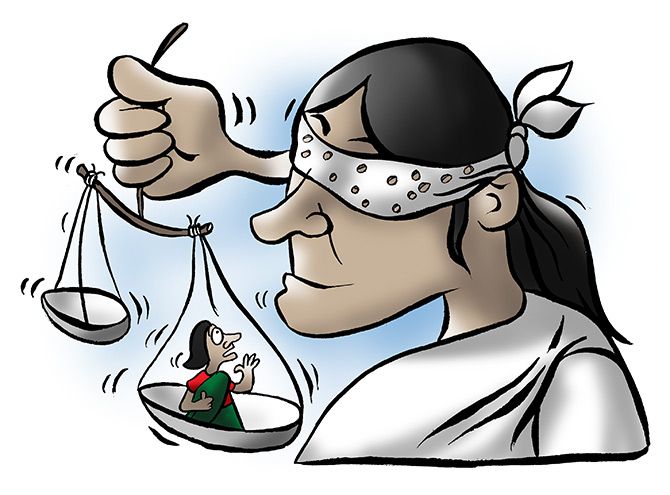While it's important for the courts to enjoy public trust, says Mitali Saran, the only way to protect the institution is to scrupulously prove its credibility.
Illustration: Uttam Ghosh/Rediff.com

I am relieved that someone has finally explained things. I was wondering what is happening in our courts.
Why is senior lawyer Fali Nariman talking about the complete breakdown of communication between Chief Justice of India Dipak Misra and his colleagues?
Why did the four second-most senior judges of the Supreme Court hold a press conference, which is very unusual for judges, so that history wouldn't accuse them of selling their souls?
On the other hand, some other judges who deposed details of their actions at the time of Judge B H Loya's death also held a press conference not long before this, so maybe judges holding press conferences is not that unusual?
I don't know.
We laypeople have limited brains, so instead of seeing the subtle brilliance of the thing, it can appear merely peculiar to us that a judge would hear a case involving himself, as the CJI did the Prasad Educational Trust case.
On the other hand the chief minister of Uttar Pradesh, Ajay Bisht recently withdrew a criminal case against himself. So maybe that is the way people in positions of authority do it?
Anyway, the Supreme Court delivered a judgment dismissing all petitions that asked for an independent probe into Judge Loya's death.
If you remember, Judge Loya was in the midst of hearing the Sohrabuddin Sheikh alleged encounter killing case in which Amit Shah was an accused, when he died three years ago.
The judge before Justice Loya was transferred, in contravention of the Supreme Court's direction that one judge should hear the case from start to finish.
The judge after Justice Loya somehow managed to read thousands of pages in a couple of days, and promptly acquitted Mr Shah.
Reports in Caravan magazine raised doubts about the naturalness of Judge Loya's death.
This is obviously a bombshell of a story not only because it suggests interference in a judicial process, but also because it suggests that judges are vulnerable to intimidation and foulplay; and that the live ones would be forgiven for taking the dead ones as a hint.
Anyone who has read the 22 stories published by Caravan in its Pulitzer Prize-worthy investigation would have to twist their brains into a pretzel and lick the backs of their heads with their tongues while spinning in a barrel, to be able to cast aside all suspicion of foul play.
Based on the material available with the publication -- not all of which, for various reasons, was called in as evidence -- it seems not just reasonable, but absolutely imperative, to set doubt to rest with a thorough, impartial, probe. That is how untrained eyes might see it.
The bench (including the CJI) hearing the Loya case, to the contrary, found no reason to doubt that the man died naturally of a heart attack.
I am not trained in the law, but what I gather from the judgment is that a large part of its reasoning is that a. judges do not lie and b. the motive of the petitions is to attack the integrity of the institution of the judiciary, which cannot be allowed.
It pointed out that Judge Loya's son recently said that he had no questions about his father's death (he had previously written that if anything happened to him, the Bombay high court would be responsible).
Other members of Judge Loya's family reacted to the judgment by saying that it was not according to their expectation, and that they had lost hope.
After all, it was they who kicked this whole story off.
Speaking as a typical birdbrain from the laity, I understand that it is important for the courts to enjoy credibility and public trust. After all, they are our last institutional recourse against injustice and abuse of power.
After the courts, it is all boots on the streets.
But with due respect, and for that very reason, I do have one question.
When the issue at stake is the integrity of a judiciary without fear or favour, how does it bolster the court's credibility and integrity to refuse a probe and place judges above rigorous scrutiny?
The bench said this was to protect the institution. But surely the only way to protect the institution is to scrupulously prove its integrity?
A probe would clear the courts, which would reassure the public, or clean house in the courts, which would also reassure the public.
As George Bush said, 'Trust, but verify.'
As a mere citizen, I wouldn't really know. Maybe the dozens of Rajya Sabha members who have initiated impeachment proceedings against the CJI know better.











